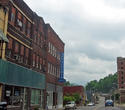I nearly fell off my bicycle when I read that driving had declined 43% in the United States and transit use had increased 65%. Australia's The Fifth Estate attributes these figures to Professor Peter Newman of Sydney's Curtin University at an event at the Hassell architectural and urban planning firm offices in Sydney. In speaking about a declining driving trend in Australia, The Fifth Estate reports Professor Newman as saying that:* read more »
Newgeography.com - Economic, demographic, and political commentary about places
Chickens from Wal-Mart?
As I arrived for a visit, my 90 year old father was perusing ads from his favorite big box store for chicken parts. Seizing the moment that all children savor, I sought to impress him with my declaration: "I buy my chicken parts – albeit at higher prices – at the natural foods store; you know daddy, where the chickens ate naturally off the barn yard floor like they did when you were a boy"? Not missing a beat and dashing my hope for an "at a boy," he retorted: "I saw what those chickens ate off the barnyard floor and I'll buy my chickens at Walmart(s)!" read more »
The Decline and Revival of an American Suburb
In 1952, a white Protestant couple from Pasadena, California along with their newly born first child, moved 22 miles east to a small town called Covina. There, among acres of open space and endless rows of orange, lemon, and avocado trees, the young family was able to purchase a plot of land and build a brand-new home with swimming pool for a total of $20,000. read more »
Tribes And Trust
Only Tribes held together by a group feeling can survive in a desert.
--Ibn Khaldun, 14th century Arab historian
Time to chuck into the dustbin the cosmopolitan notions so celebrated at global conferences: a world run by wise men of the United Nations, science-driven socialists or their ostensibly more pragmatic twins, global free marketers. We are leaving the age of abstractions and entering one dominated by deep-seated ethnic, religious and cultural loyalties, some with roots from centuries and millennia ago. read more »
We Trust Family First
Americans, with good reason, increasingly distrust the big, impersonal forces that loom over their lives: Wall Street, federal bureaucracy, Congress and big corporations. But the one thing they still trust is that most basic expression of our mammalian essence: the family. read more »
Distilling China’s Development
The economic rise of China has created two growth industries pulling in opposite directions. There’s either the school of blind praise of ‘The China Miracle’ or its opposite, apocalyptic predictions about the country’s impending implosion. read more »
How Texas Avoided the Great Recession
Lately, Texas has been noted frequently for its superior economic performance. The most recent example is the CNBC ratings, which designated the Lone Star state as the top state for business in the nation. Moreover, Texas performed far better than its principal competitor states during the Great Recession as is indicated in our How Texas Averted the Great Recession report, authored for Houstonians for Responsible Growth.
Introduction: How Texas averted the Great Recession: read more »
Civic Choices: The Quality vs. Quantity Dilemma
Advocates on opposite sides of urban debates often spend a great deal of time talking past each other. That's because there's a certain Mars-Venus split in how they see the world. In effect, there are two very different and competing visions of what an American city should be in the 21st century, the “high quality” model and the “high quantity” model One side has focused on growing vertically, the other horizontally. One group wants to be Neimans or a trendy boutique and ignores the mass market. The other focuses more on the middle class, like a Costco and Target. read more »
Locals Flee from New South Wales
A newspaper headline “Fleeing locals ease population pressure on New South Wales” highlights a trend over the last few years. Since 2002 the Australian state of New South Wales, the country’s most populous with over seven million residents, has been losing its residents to other states at some 20,000 per year. read more »
More Clouds Over Sky-High Metro Housing
Can housing costs get so high that they repel new migrants, and stunt a metropolitan area’s economic growth?
For potential migrants looking for a job, metropolitan areas—and in particular large metropolitan areas—are the places to be. People move in because that's where the jobs are. More than 93% of non-farm jobs in the U.S. are in the 100 largest metropolitan areas. The biggest 15 metro areas account for 34% of the nation’s jobs. Big places also have the benefits of cultural amenities, educational institutions, and impressive retail and restaurant environments. read more »
- Login to post comments





















